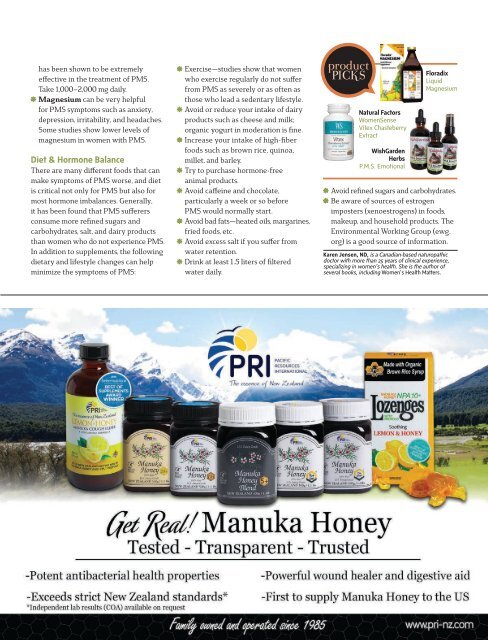Create successful ePaper yourself
Turn your PDF publications into a flip-book with our unique Google optimized e-Paper software.
*<br />
has been shown to be extremely<br />
effective in the treatment of PMS.<br />
Take 1,000–2,000 mg daily.<br />
Magnesium can be very helpful<br />
for PMS symptoms such as anxiety,<br />
depression, irritability, and headaches.<br />
Some studies show lower levels of<br />
magnesium in women with PMS.<br />
Diet & Hormone Balance<br />
There are many different foods that can<br />
make symptoms of PMS worse, and diet<br />
is critical not only for PMS but also for<br />
most hormone imbalances. Generally,<br />
it has been found that PMS sufferers<br />
consume more refined sugars and<br />
carbohydrates, salt, and dairy products<br />
than women who do not experience PMS.<br />
In addition to supplements, the following<br />
dietary and lifestyle changes can help<br />
minimize the symptoms of PMS:<br />
*<br />
Exercise—studies show that women<br />
who exercise regularly do not suffer<br />
from PMS as severely or as often as<br />
those who lead a sedentary lifestyle.<br />
* Avoid or reduce your intake of dairy<br />
products such as cheese and milk;<br />
organic yogurt in moderation is fine.<br />
* Increase your intake of high-fiber<br />
foods such as brown rice, quinoa,<br />
millet, and barley.<br />
* Try to purchase hormone-free<br />
animal products.<br />
* Avoid caffeine and chocolate,<br />
particularly a week or so before<br />
PMS would normally start.<br />
* Avoid bad fats—heated oils, margarines,<br />
fried foods, etc.<br />
* Avoid excess salt if you suffer from<br />
water retention.<br />
* Drink at least 1.5 liters of filtered<br />
water daily.<br />
*<br />
*<br />
product<br />
PICKS<br />
Natural Factors<br />
WomenSense<br />
Vitex Chasteberry<br />
Extract<br />
WishGarden<br />
Herbs<br />
P.M.S. Emotional<br />
Floradix<br />
Liquid<br />
Magnesium<br />
Avoid refined sugars and carbohydrates.<br />
Be aware of sources of estrogen<br />
imposters (xenoestrogens) in foods,<br />
makeup, and household products. The<br />
Environmental Working Group (ewg.<br />
org) is a good source of information.<br />
Karen Jensen, ND, is a Canadian-based naturopathic<br />
doctor with more than 25 years of clinical experience,<br />
specializing in women’s health. She is the author of<br />
several books, including Women’s Health Matters.

















